Retirement is no longer slippers and a pipe. Our golden years are the time to reap the rewards of years of hard work. Increasingly, retirees are choosing to move abroad for adventure, cost-of-living, and to explore a different lifestyle. Europe has long been a favorite retirement destination, so we took a deep dive into the best country in Europe to retire in 2023.
So, how do you choose between moving to Spain, France, Ireland, Greece, and other European favorites? To make your decision easy, we’ve looked at multiple factors, including the cost of living, visas, weather, and more, to help you choose your European retirement destination.
The Best European Countries for Retirement
We’ve looked at various factors to crown one country as the best in Europe for retirement. We’ve looked at population, life expectancy, cost of living, house prices, visas, safety, beaches, and healthcare to reveal Europe’s top destinations.

1 > Portugal – 7.83 retirement score (Best country in Europe to Retire)
Based on our index, the best retirement country in Europe is Portugal, with a retirement score of 7.83 out of 10. Portugal is a safe country, with a high percentage of its population aged 65 and above. It offers plenty of sunshine, good-quality beaches, as well as a reasonably low cost of living. One of the many things Portugal is famous for is its wine and port. Add spectacular golf courses and incredible scenery; it is the complete package. Lisbon is a firm favorite of the European capitals, but retirees also love the more diverse parts of Portugal.
=2 > Spain – 7.31 retirement score
Two countries share second place with a retirement score of 7.31 out of 10. Let’s look at Spain first. Retiring in Spain has long been a favorite with British and American retirees. Spain is a consistent scorer across all of our categories. The life expectancy in Spain is the second highest in Europe, behind Switzerland, and is helped by excellent and affordable healthcare. And for keen beach-goers, Spain has more Blue Flag sites than any other country in the world. The Spanish retirement visa is well-established and easy to qualify for. Spain is one of seven countries in Europe that offer this immigration option.
=2 > Italy – 7.31 retirement score
Italy shares second place with Spain, with a score of 7.31 out of 10. Not only do Italians have one of the highest life expectancies in Europe, but it’s also proven to be a popular choice for retirees, with a higher percentage of people aged 65 and above than any other European country. Retirees love Italy for the leisurely pace of life; La Dolce Vita is a reality for many. Food, culture, and natural beauty surround you. Iconic Florence, Rome, Venice, and Milan hold their own compared with other European cities, and the quiet rural parts of Italy impress many Expats.
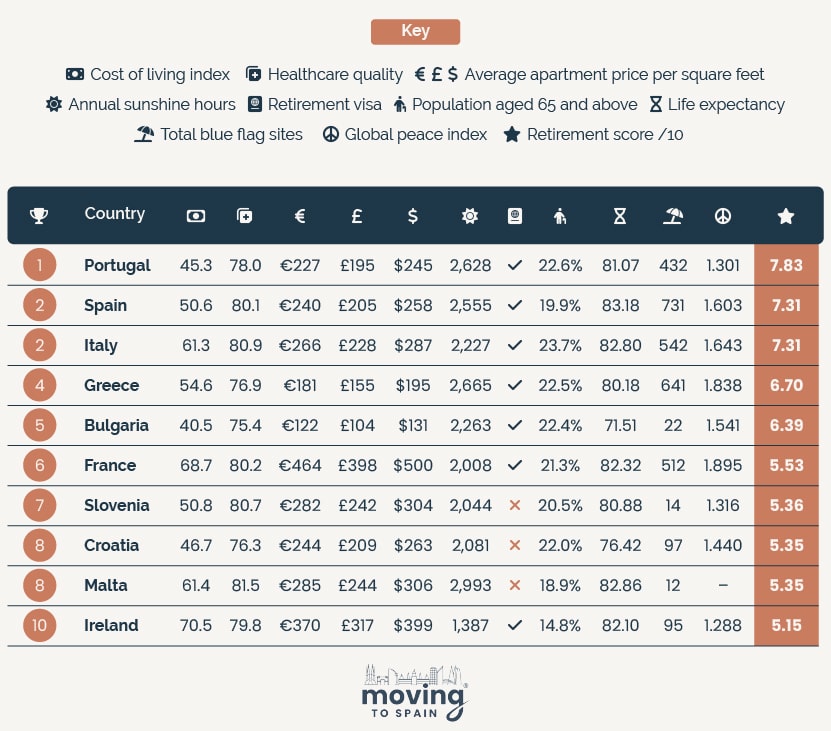
Cost Of Retiring in Europe
We compared the average cost of living and the cost of apartment rentals (in Euros, Pounds, and US Dollars) to this key factor. Moving to a low-cost-of-living country can stretch your pension and investments, giving you a Golden Years upgrade.
Healthcare
Healthcare and private health insurance only get more critical as the years pass. Access to quality medical care at reasonable prices is crucial for all retirees. The best country in Europe to retire will be able to care for all your healthcare needs without breaking the bank.
Retirement Visas
Without a European Union passport, you’ll probably need a visa to live in Europe. While other options are available, we looked at countries with a specific retirement visa without hurdles like language ability. Many retirement visas are also called passive income visas, a well-known example being the Portuagl D7 passive income visa.
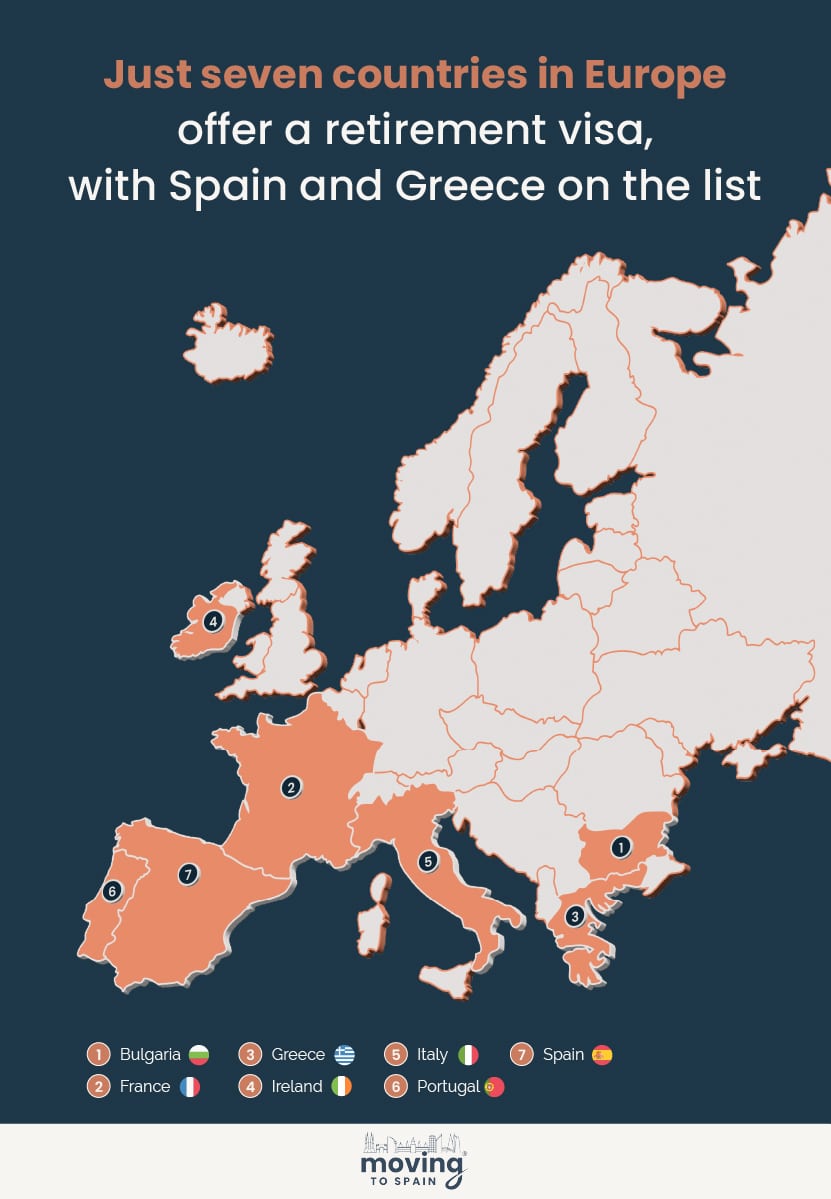
European Countries With The Highest Percentage Population Aged 65+
Countries with a large ratio of retirement-age population tend to provide excellent services to this community. Politicians and businesses listen when there is a significant voice to be heard. To find out which country had the most retirees, we looked at the percentage of the population aged 65 and above for each European country. On average, 19.28% of the population in European countries are aged 65 and above. Although Spain’s percentage of 19.9% is slightly higher than Europe’s average, it doesn’t make the top 10.
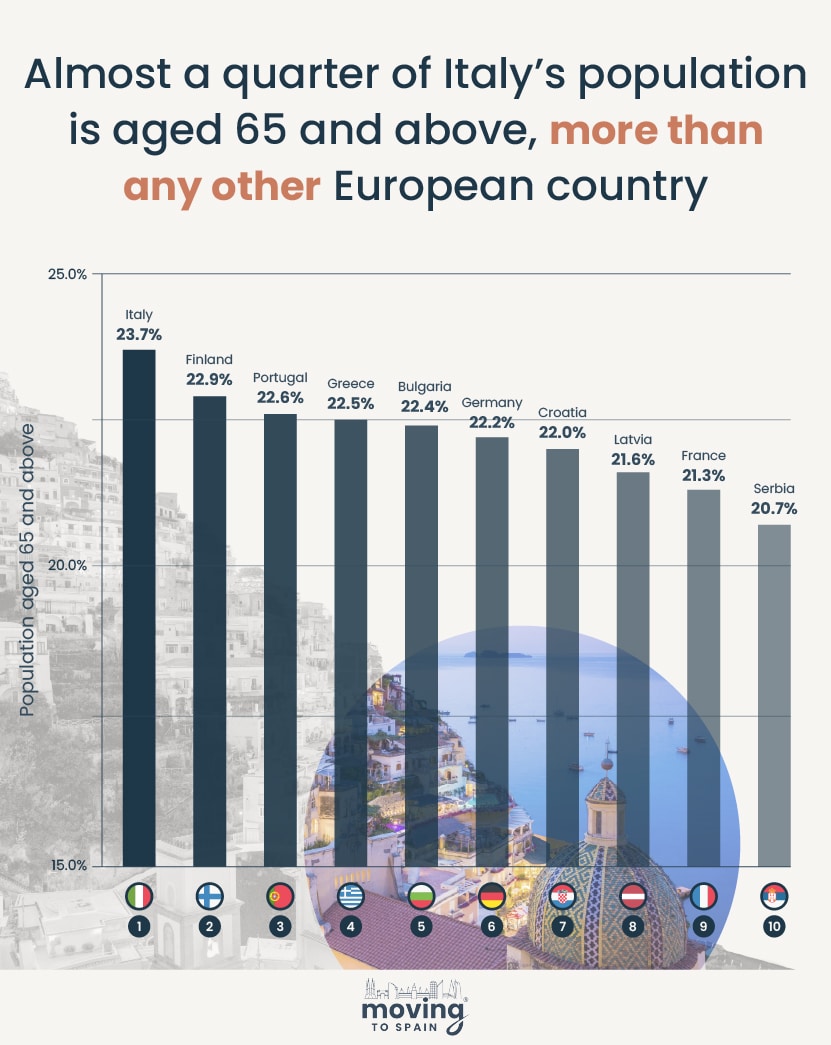
1 > Italy – 23.7% of its population aged 65 and above
With the highest percentage of its population aged 65 and above, Italy takes the top spot. Almost 24% of Italy’s population is aged 65 and above; however, the retirement age in Italy is 67. Italy also has one of the highest life expectancies in Europe, at 82.8 years of age.
2 > Finland – 22.9% of its population aged 65 and above
Second place goes to Finland, with almost 23% of its population aged 65 and above. Finland’s life expectancy also sits in the top half of the European countries, with a life expectancy of 81.93 years of age. The retirement age in Finland is currently 64. However, there are plans for this to rise by 2030, depending on the country’s life expectancy.
3 > Portugal – 22.6% of its population aged 65 and above
Spain’s neighbor, Portugal, completes our top three with 22.6% of its population aged 65 and above. Like Finland, the retirement age in Portugal will rise along with the life expectancy, which is currently 81.07. The retirement age in Portugal is 66 years and seven months, one of the highest in Europe.
The Countries with the Most Blue Flag Beaches in Europe
Blue Flag is an award given to beaches, marinas, and tourism boats based on several criteria, including cleanliness and safety. It shows that a country has lots of coastal areas that retirees love and that it takes care of them. We’ve revealed the countries with the most Blue Flag sites in Europe.

1 > Spain – 731 Blue Flag sites
Spain takes the top spot with a total of 731 Blue Flag sites. Spain’s total is made up of 629 beaches, 97 marinas, and five boats. The region of Spain with the most Blue Flag beaches is Valencia, with 153, followed by Andalucia and Galicia, with 148 and 125, respectively. Catalonia is fourth with 120.
2 > Greece – 641 Blue Flag sites
Greece takes second place, with 641 Blue Flag sites. Greece has 617 beaches and 18 marinas—one more than Spain. Halkidiki, Rhodes, and Crete are the areas with the most Blue Flag sites.
3 > Italy – 542 Blue Flag sites
Number three is Italy, with a total of 542 Blue Flag sites. Italy doesn’t have any tourism boats awarded with a Blue Flag. Regardless, Italy is home to 458 beaches and 84 marinas awarded a Blue Flag. The Italian region of Liguria is home to the most Blue Flag beaches, with over 30.
The Sunniest Countries in Europe
Retiree interviews consistently cite sunshine and the outdoors as giving huge satisfaction. Spending retirement in the sun is the dream for many. That’s why we’ve looked at which European countries get the most sunshine each year. Spain had the fourth-highest number of sunshine hours per year, with 2,555 on average, but which three countries beat Spain’s total?
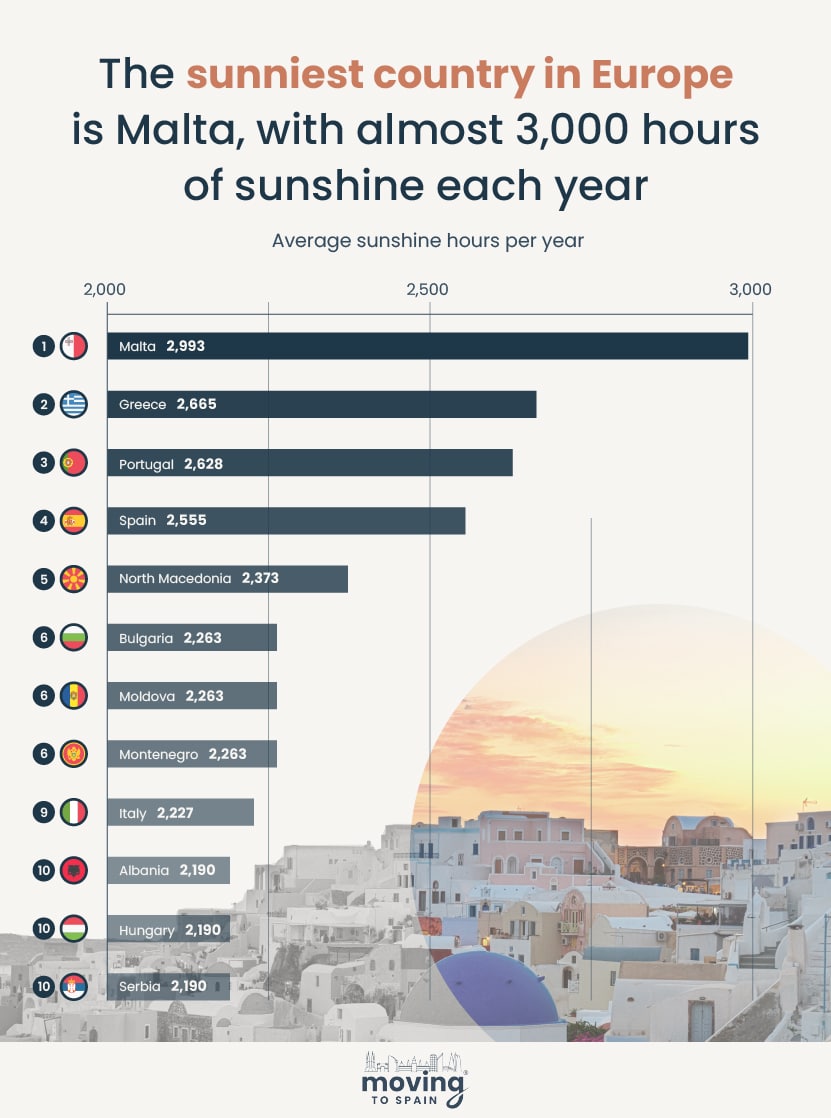
1 > Malta – 2,993 average sunshine hours per year
Malta takes the top spot with an average of almost 3,000 sunshine hours annually. Located in the Mediterranean Sea, off the coast of Sicily, Malta is known as the jewel of the Mediterranean. Of course, it’s a sweltering country, with average summer temperatures reaching 30°C. However, its culture and rich history are also part of the attraction that seduces many tourists each year.
2 > Greece – 2,665 average sunshine hours per year
Second place goes to Greece, averaging an incredible 2,665 sunshine hours each year. Greece continues to prove what a great country it is for retirement. In Greece’s capital city, Athens, the average temperature during July and August is just under 30°C, meaning that temperatures could be more than 35°C at the hottest point in the day.
3 > Portugal – 2,628 average sunshine hours per year
Completing our top three is Portugal, with an average of 2,628 sunshine hours per year. Unfortunately for Spain’s next-door neighbors, Portugal’s average summer temperatures aren’t quite as high as first and second place in our list. Average summer temperatures in Lisbon and Porto are just over 23°C and 21°C, respectively.
Where Does Spain Rank As A European Retirement Destination?
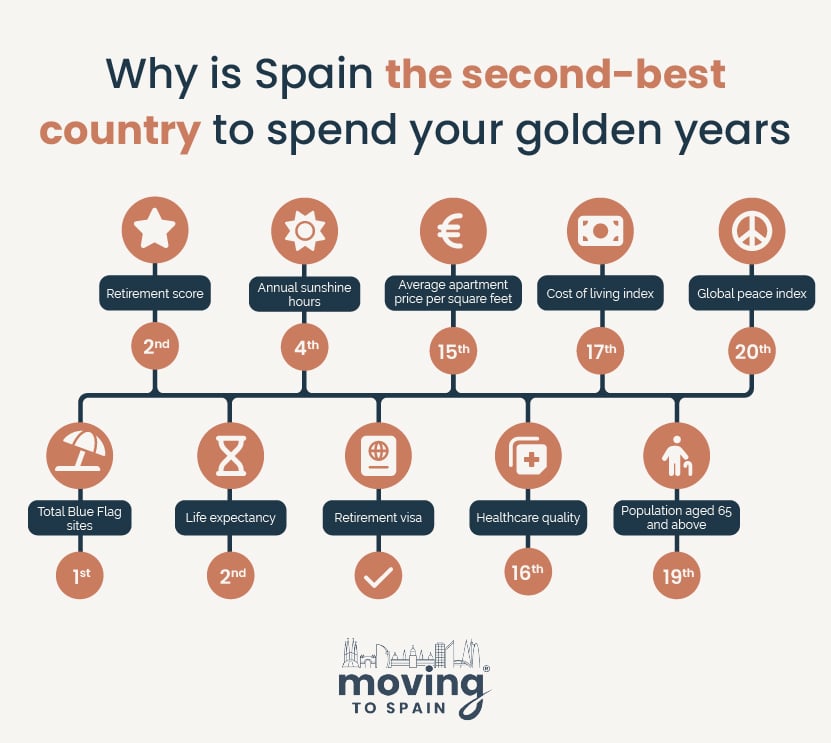
A total of 37 European countries made our initial list, and in seven out of nine factors, Spain ranked in the top half of countries. In five factors, Spain ranked in the top 10, showing why we ranked it the second-best country to spend your retirement. These factors also explain why moving to Spain from the USA is so popular.
Not only can Spain offer you some of the best weather that Europe has to offer, but it also has some of the safest and cleanest beaches in the world. Spain also has the second-highest life expectancy in Europe. Spain’s cost of living is slightly below the average on our list. However, some countries have a cheaper cost of living.
Immigration red tape isn’t a problem if you use an experienced immigration lawyer in Spain for your visa or residency application.
That’s Our Best Country In Europe To Retire Index
Social media, video calls, and cheap air travel have all made retiring abroad easier for people worldwide. Europe remains many retirees’ first choice for many reasons. We’ve used these key factors to pick the best country in Europe to retire to—we hope you enjoy exploring it.
Methodology
- We used the Economics and Peace Global Peace Index for safety data.
- We used Numbeo to calculate the cost of living scores and the price per square meter to buy an apartment. For apartment prices, we took an average of the cost per square meter for the city center and outside the city center.
- We used The World Bank for the life expectancy at birth and the percentage of the population aged 65 and above.
- We used Prosperity to find the 2022 healthcare quality scores.
- We used Blue Flag to find the number of Blue Flag sites in each European country.
- We used World Data to find the average sunshine hours per year.
- Finally, we used Where Can I Live to find the countries that offer retirement visas.
- We put this data into a weighted table, normalizing each factor with a score out of 10. We then averaged these scores to get an overall score out of 10.









What about availability of good doctors, good hospitals, elderly care? What about the costs of healthcare? It’s not all beaches and sunshine.
Hi CJ – the index does include healthcare as a critical factor as we understand the importance for retirees. The metric of the national healthcare system comes from the Legatum Prosperity Index, which measures the quality, accessibility, and cost of healthcare in each country. Please see the methodology at the end of the index for more information on the calculation. While beaches and sunshine are factors, they rank behind healthcare, cost of living, safety, and access to a retirement visa. Many thanks, Alastair.
I am surprised that Cyprus did not make the top ten.
Maybe that is because taxation is not considered at all.
Once you consider the taxation policies the list would look rather different.
e.g. if you are a US citizen, a small number of countries in Europe have favorable double-tax treaties in force which exempt US citizen pensions/social security income from local taxes.
Portugal recently got rid of their non-habitual domicile tax regime, resulting in a big jump in taxes for foreigners, You provided no discussion of that.
A strategy to consider is to establish legal residency in a country with favorable tax laws, and them make shorter trips to other countries.
Hi Charles – we’ll be updating the list for 2024, and the changes to Portugal’s NHR tax regime and Golden visa program will definitely impact the new ratings. We’ve also received some excellent feedback on the factors we used, so look out for the updated 2024 list coming soon. THnaks, ALastair
Just wondering where Romania is on the list? I am an expat and have been living here for over 10 years.
Hi Eric – Romania was ranked at number 20 – lower healthcare and safety index factors, plus no designated retirement visa offset some strong scores. We’ve heard some great things from Expats living in Romania – it definitely is a good option for some people. All the best, Alastair.
Hello, Eric,
Please tell me more about Germany and how it ranked. It’s 1/3 preserved forest, very welcoming to expats and has some of the best healthcare in the world. While it obviously lacks the coastlines of Spain, Portugal, Italy, Croatia and Greece, its tradition is steeped in healthy living as a priority. Similar could be stated for Netherlands and Austria. Curious to learn more or access the full report, please.
Thank you,
Ken
Interested in knowing in which of these countries mentioned is there better ADA mobile wheelchair access in?
Hi Claudia – while we don’t have overall country figures, this study found some clear winners and losers in wheelchair access in European capital cities – https://ablemagazine.co.uk/new-study-reveals-the-most-and-least-accessible-cities-for-disability-travellers-in-europe/. While the study looked only at capital cities from a tourism perspective this does map pretty well to anecdotal evidence from friends. Northern and Western Europe generally has better access than Eastern Europe. We have a friend who uses a chair and lives in Barcelona, and he finds the city well-managed for chair access. However, in his experience, smaller cities and towns in Spain don’t have the same access, so a country-wide view may be hard to come by. All the best, Alastair
Do you also measure/rank specific cities in each country? If so, which city in top-rated Portugal does your methodology consider as best? Lisbon? Porto? Coimbra? A different city in Algarve or elsewhere in Portugal?
Hi Chuck – this Index measures at the country level. Keep an eye out for more detail, or head to our sister site (https://wherecani.live/blog/view/living-in-portugal/) to explore some of the best places in Portugal. Regards, Alastair
Great information, We are looking at moving to Spain in 2024.
Thank you!
JOHN AND SUSAN PAZERA
@LatitudeAdjustment
Travelers, expats, and bloggers currently residing in Colombia
Glad you found it useful and we hope the rest of the site makes your Spain move easy… Cheers, Alastair
What about a rating for difficulty/potential for getting a retirement/long stay visa confirmed? My understanding that France is much easier than Italy. I’d love to aim for Italy rather than France, but don’t want unending hassle.
Hi Melissa – the hassle is a tricky metric to measure, but anecdotally Italian immigration is more challenging to negotiate than the French system. Finding a good immigration lawyer or advisor can smooth out some of the bumps. All the best for your move, Alastair
The question is if the European countries acknowledge our health care insurance and if our insurance pays in Europe.
Paying out of pocket is for most of us out of question. . .
Hi Skip. Healthcare costs are a crucial consideration for many retirees. If you move to Europe, in many cases, you’ll need to take out local private health insurance as part of your visa application. In most European countries, this cover costs a fraction of similar coverage in the USA. And, in countries like Spain, once you are a permanent resident, you can apply for public cover, which is free or heavily subsidised. All the best, Alastair
About how long does it take to get permanent residency in Spain?
Hi Tere. You can apply for PR after five years of living in Spain on a qualifying visa or residence permit. All the best, Alastair
Using this list – where would the United States rank?
Following…. I am also wondering how Canada would rank on this list?
Thanks so much! 🙂
I’d love the answer to this question too! Thanks.
Interested in moving to Portugal though my husband is not. We’re taking our first trip there in 2024. My question is whether Portugal offers rentals of good standing in order to come and go? How might I explore an option such as this or are there other considerations? Thank you!
Thanks for the work and the explanation of methodology (as well as the sources!). We’ve been scouting many of these same factors and they match up well with what we have been able to put together.
Wonderful to hear all these things about Spain! Can you please let us know about property taxes in Spain? I hear they are pretty high.
Hi Astrid. The local government sets annual property taxes, and so they vary across the country. Please see our Spanish Tax Guide for more information. There are addtional one-off taxes paytable on any property transfer – so on the sale of a house. See our Buying Property in Spain Guide for more on these taxes. All the best, Alastair
Very interesting and helpful.
I do wonder where is Poland on your list?
I would like to move to 🇮🇹
Rome. Our Culture plus sun and food. However I suppose that Spain and Portugal are slightly cheaper, aren’t they?
Regards
Anna Beauchamp
Curious where Lithuania is on the list?
I’m very surprised that Portugal is number 1. In my experience, forget about any kind of actual house in Portugal, they just don’t exist or at least they’re not for sale. I’ve been looking online , using idealista.pt and others, for affordable retirement housing in Portugal (Albufeira & Greater Lisbon) all summer but have literally found nothing promising at all. No actual “houses” by American standards for less than $350k. Americans could do much better in Greece, not to mention the Carolinas or Florida.
I’ve been using Idealista.pt to search for houses in the Lisbon & Algarve regions but I’m not finding anything really. Especially nothing with a garage. (Searching for homes less than $300k)
Am I using the wrong resource or are private detached homes just generally not available in these regions?
Hi Michael – I’d suggest contacting a reputable estate agent or buyer’s agent in the areas of interest to see if they can narrow your search. Private detached houses should be available, but it may take some local knowledge. All the best, Alastair
You show an average price per square feet for Portugal of $245 but you don’t specify the size of the apartment. What is the size of the apartment in your study?
HI John – as described in the methodology at the bottom of the Index : “We used Numbeo for the cost of living scores and the price per square meter to buy an apartment. For apartment prices, we took an average of the cost per square meter for the city center and outside the city center.” All the best, Alastair
Do you still rank Portugal #1 with the elimination of NHR? Taxes are very high now for expats as well as citizens.
Hi Laurence. There’s no doubt that changes to the NHR and Portugal golden visa have changed the overall balance (as have Spain’s extension of Beckham law provisions to offer more people great tax relief). We’ll update the index in a few months for 2024 and see if Portugal can keep its crown. All the best, Alastair
Where does Germany fall?
Hi Judy – Germany ranked 15th with a higher cost of living, no dedicated retirement visa, and lower sunshine hours key factors keeping it out of the top 10. Regards, Alastair
There is no mention of culture or the arts in any of your measurements. The presence of art museums and cultural experiences is the top of my list.
Hi Lollie. You are correct that we didn’t use these factors as they are very personal lifestyle quality indicators. We surveyed many Expat retirees and retiree forums and used the most common factors to make our choice. We accept that Blue Flag beaches could be classified similarly, but retiring to the sea was a very common international retirement requirement for many. Happily, many European countries have spectacular art museums and cultural experiences, with our top three of Portugal, Spain, and Italy high on those lists, too. All the best, Alastair
If one gets a resident visa in Spain, are you taxed for your global income? I have passive income, which country allows residency without having to pay income taxes in Europe which are much higher than in the USA?
Hi Luis – you are taxed on your global income if you are a resident of Spain for taxation; it is not directly dependent on your visa. You can see more in our guide to Expat taxes in Spain Regards, Alastair
Luis’ concerns were my questions too. Is there a breakdown of taxation by country for your great list/article Alastair?
Hi John. It is tough to compare taxation in different countries for different people. Here are two examples. You’ll pay no Low Income Tax and no Wealth Tax if you qualify for the Beckham Law in Spain. Portugal’s NHR residents have a very different tax profile from that of non-NHR residents. We’re working with our cross-border financial planners to put some examples of taxation impacts in various European countries, and we’ll aim to include this in the 2024 Index. All the best, Alastair